“Late Spring” (1948)
After the war, Ozu returned to filmmaking with two movies that in many ways stand out as atypical in his filmography — 1947’s “Record Of A Tenement Gentleman,” and 1948’s “A Hen In The Wind,” respectively about children made homeless by bombing raids, and about soldiers returning from the war and reuniting with their families. These two films are still somewhat overlooked (rather unfairly, particularly in the case of the latter), but it’s perhaps understandable given that they were swiftly followed by “Late Spring,” the film that set the tone for the final act of the director’s career, and which is almost indisputably counted among the finest of his masterpieces (the most recent Sight & Sound poll named it the fifteenth greatest film ever made). It’s the first of three (a trilogy completed by “Early Summer” and “Tokyo Story”) in which his soon-to-be-regular collaborator Setsuko Hara plays a woman called Noriko. In this case, she’s an unmarried 27-year-old woman who still lives at home, caring for her widower father (Chishu Ryū), whose family conspire to find an arranged marriage for her. It could, from premise alone, sound like an Austen-ish comedy of manners, and perhaps the film that Ozu might have made early in his career. Here, though, it’s an immaculate, gentle drama in which society gets in the way of the happiness of a father and daughter, and growing up and moving away isn’t so much a victory as a bitter cost of time and change. Unfolding in an even more leisurely manner, and missing much of the humor of the earlier work (though none of the humanity), the film saw Ozu embrace the shomin-geki genre (a word invented to describe this sort of social realism drama about the lives of ordinary people, and a genre that Ozu perfected) most fully and then never let it go: it sets the tone for everything that was to come, and not just because Ozu would riff on it more than once over the rest of his career.

“Tokyo Story” (1953)
If you’ve seen one Ozu film, it was most likely “Tokyo Story,” the best known of his films, and the one that helped to establish his reputation in the U.S. and elsewhere (though not for nearly two decades after its Japanese release: it only reached these shores in March 1972). It’s frequently named among the greatest movies ever — in 2012, Sight & Sound’s poll of filmmakers put it in their number one slot (and critics in their number three). It’s in many ways the perfect entry point to Ozu, exemplifying so much of what’s special about his work, especially in the almost untouchable third act of his career. Reuniting him with his stars of “Late Spring” and “Early Summer,” and closing off the so-called Noriko trilogy, it sees an elderly married couple (Chishu Ryū and Chieko Higashiyama) travel to Tokyo leaving their youngest daughter (Kyōko Kagawa) behind, to visit their other children. Their eldest son and daughter (So Yamamura and Haruko Sugimura) both married, treat their parents mostly as an inconvenience, with only Noriko (Hara again), who was married to their son before his death, paying them any attention, and soon, the children will find that it’s too late. It’s a riff on the same sorts of themes as the earlier films in the trilogy (and in much of Ozu’s work); of old age, the responsibility of children towards their parents, the gulf that can exist between the generations, the loss that comes with change. “Tokyo Story” sees Ozu at once both quiet and angry — Yamamura and Sugimura’s selfishness engenders a fury in the viewer that’s rare for the director — and arguably in a more conciliatory place, with Noriko generously defending her brother and sister-in-law in the film’s famous final moments. It’s an exquisite and perfect piece of work, and deserves every inch of its towering reputation.






The Tokyo Story synopsis has quietly been corrected.
Thank you for pointing out those mistakes, they\’ve been fixed.
This article is littered with inaccuracies, including its statement-as-fact that Ozu\’s career began with a short film. Ozu never made anything but features. The most glaring discrepancy is his assertion that the youngest daughter went to Tokyo with her parents, as David mentions above. A decent list, but the fundamental errors make the whole piece difficult to respect.
I understand that it\’s insanely hard to try to narrow down Ozu\’s filmography into 5 essential films but I would\’ve really liked to see An Autumn Afternoon on there. He was a director that only got better with age and his last movie was unsurprisingly his best one.
I really love There Was a Father.
Kyoko obviously doesn\’t accompany her parents on their trip to Tokyo in "Tokyo Story," as is erroneously mentioned here. That would be a VERY different movie.
"Early Summer" is my absolute favourite Ozu film. It encapsulates the themes of his entire career perfectly.
Are you mad?! "Good Morning" is so essential and different from "I Was Born But…"
Are you mad?! "Good Morning" is so essential and different from "I Was Born But…"
Are you mad?! "Good Morning" is so essential and different from "I Was Born But…"